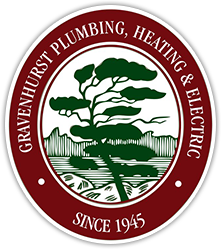How Does Geothermal Heating Work?
Are you ready to reduce both your carbon footprint and your monthly heating and cooling costs? A geothermal heating installation can do both!
Geothermal HVAC is becoming one of the most efficient heating and cooling solutions. It draws from the earth’s thermal properties, relying on a renewable energy source to operate.
Avoiding the combustion of fossil fuels, homeowners are now able to:
- Start saving on fuel costs.
- Reduce their greenhouse gas emissions.
- Reduce their utility costs.
- Increase their home equity and more!
The list goes on and on.
But, how does geothermal heating work anyway?
The Process of Geothermal Heating Explained
A geothermal system heats and cools your home with a renewable energy source - the earth!
As mentioned above, a geothermal HVAC system uses the earth’s thermal energy to operate. It captures, carries and converts thermal energy between an underground energy source and the air.
Geothermal heating and cooling use three pieces of geothermal HVAC equipment:
- An Indoor Heat Pump
- Ground Loops
- An Indoor Distribution System (ductwork or radiant in-floor heating)
Each of these components works together to connect the source of thermal energy (heat source) with its input destination (heat sink).
During the summer:
The heat pump will,
a) Remove heat from the indoor air,
b) Transfer it outdoors using the ground loops and
c) Deposit it into the earth/water source.
In this case, your home is the heat source while the earth or water becomes the heat sink.
During the winter:
The ground loops carry heat energy to the heat pump. The air passing through the heat pump warms up using this heat energy and travels through your home's ductwork - successfully heating your home!
In this case, your home is the heat sink while the earth or water becomes the heat source.
How warm does geothermal heating get?
Air temperatures are inconsistent. That much is obvious by the variations we experience from day to night and season to season. But the temperature just below the earth’s surface? That remains pretty consistent.
In Ontario, the temperature a few feet below the earth's surface stays around 3-11 degrees Celcius. Although this exact temperature depends on your specific region, the average remains the same. This consistent ground temperature is what provides a reliable source of heat energy regardless of the season!
So, how does this heat energy get from the ground to your home?
The Two Different Types of Geothermal Ground Loop Systems
There are two types of ground loop systems: open-loop and closed-loop. Both systems transfer heat energy using water, but they do so differently.
Let’s explore how these varying ground loop systems work.
A Closed-Loop Geothermal HVAC System
A closed-loop Geothermal HVAC system is a network of underground piping filled with water and antifreeze. This antifreeze prevents the water from freezing in winter. It’s the reason a closed-loop system can effectively carry geothermal energy from the ground to the heat pump regardless of the season.
3 Types of Closed Loop Energy Systems:
- Horizontal Closed-Loop Systems
- Vertical Closed-Loop System
- Lake/Pond Closed-Loop Systems
An Open-Loop Geothermal HVAC System
An open-loop Geothermal HVAC system connects directly to a water source, such as a well, pond or lake. The heat pump pulls water from the water supply, uses it to draw/inject heat from the ground on its way to/from the heat pump, and then deposits it back into a discharge well.
An open-loop system is compatible with both:
- Forced Air Heating and Cooling, and
- Hydronic Heating Systems
Geothermal HVAC Systems Can Also Heat Your Water!
Did you know that you can even use your geothermal heat pump to provide year-round hot water heating?
Not only is a geothermal HVAC system able to heat your home in the winter, cool it in the summer and offer radiant in-floor heating…
It can also help you save on your hot water bills too!
How? With a desuperheater! An optional (but highly recommended) addition to your geothermal system.
A desuperheater will recycle unneeded heat from the heat pump’s compressor and use it to heat your water instead.
Increase Your Energy Efficiency With a Geothermal HVAC System
Are you looking for an efficient and affordable heating and cooling solution for your home?
A geothermal heat pump provides energy savings of up to 70%!
Whether you have a cottage in Rosseau or a home in Bracebridge, you can provide heating and cooling for less.
Less money and less of an environmental impact!
Top 3 Advantages of a Geothermal Heating Installation:
- A geothermal HVAC system can turn one unit of electrical energy into three to four units of heat energy - making it up to 400% efficient.
- Geothermal systems operate quietly, keeping your home peaceful and serene.
- Geothermal systems don’t use propane, oil, or natural gas, make your home safer for you and the ones you love.
Want to learn more about geothermal HVAC? Keep reading! Our Gravenhurst HVAC technicians are here to help you make the best heating and cooling decision for your home, cottage or workplace.

